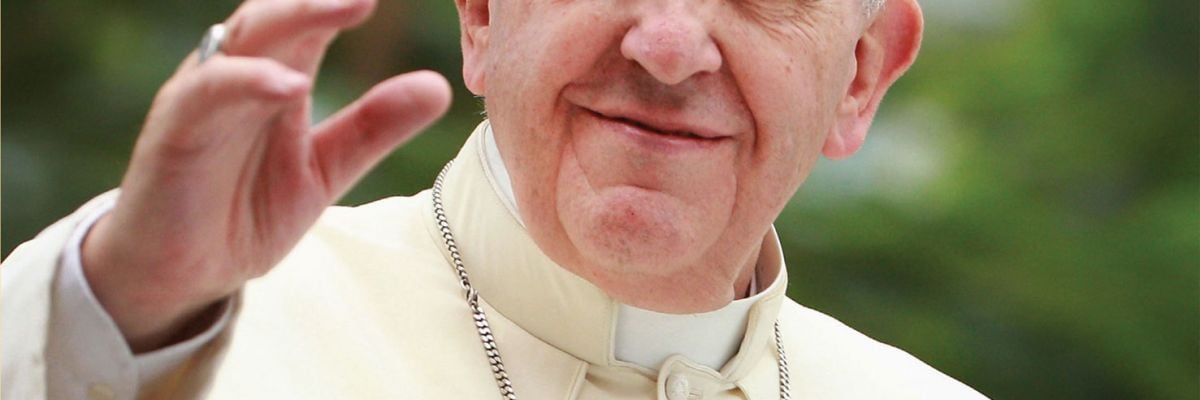
Pope Francis’s highly anticipated encyclical—Laudato Si’—is now out.
Here are 13 things to know and share.
1) What are the basic facts about this encyclical?
An encyclical is a teaching document issued by the pope. Encyclicals are among the more solemn and thus more authoritative papal documents.
This one is called Laudato Si’ (“Be praised” or “Praise be to you”)—a line from the Canticle of the Sun by St. Francis of Assisi.
It is Pope Francis’s second encyclical. His first was Lumen Fidei, which was largely drafted by his predecessor, Benedict XVI. Laudato Si’ is thus the first encyclical prepared entirely at Pope Francis’s initiative.
It is devoted to ecology and related themes.
2) Where can I read it—or just get a summary of it?
You can read it online at the Vatican website here.
The are various summaries of it online, including ones by Edward Pentin and Kevin Cotter.
3) Why did Pope Francis write this encyclical?
Care for creation is something that is close to his heart. You might guess this from the fact that he chose to be called Francis after St. Francis of Assisi, who was famed for his concern for nature (so much so that the Catechism of the Catholic Church mentions it; see CCC 2416).
More fundamentally, Pope Francis believes that there are significant ecological problems today that need to be addressed. They include not only problems in the natural environment but also in the human sphere, particularly among the poorest.
There may also be an evangelistic motive. Pope Francis is convinced that the Church needs to do more with evangelization and engaging people who currently don’t listen to the Church.
4) What is unique about this encyclical?
Several things. First, it is the only encyclical devoted to environmentalism. This topic has been the subject of many papal statements, but Francis is the first pope to devote an encyclical to it.
Second, virtually all encyclicals are addressed to the bishops of the Catholic Church, sometimes with added groups like other Catholic clergy, religious, laypeople, and even—in exceptional cases—all people “of good will.”
Laudato Si’ is different. It is not addressed specifically to the bishops with additional groups added. Instead, it is addressed to every person on the planet. This means, unlike any previous encyclical, only a minority of its intended audience is Catholic. (Catholics make up a little more than one billion of the seven billion people alive.)
Third, encyclicals are usually more centered on Catholic doctrine. While Laudato Si’ contains many elements of Catholic teaching, it is not focused on Church doctrine in the same way.
For example, the first chapter is devoted to a summary of the various environmental problems Pope Francis sees the world facing, and his summary is based on scientific studies rather than theological documents.
When he does begin focusing in a sustained way on Church teaching, in the second chapter, he begins with a note explaining why a document addressed to so many nonbelievers would have a chapter specifically devoted to religious belief. (His explanation is that science and religion can have a fruitful dialogue.)
Fourth, and related to the former, the encyclical does not simply propose views that all are expected to accept because of the pope’s religious authority. Instead, he invites the people of the world to a dialogue on the subject of environmentalism, writing:
In this encyclical, I would like to enter into dialogue with all people about our common home.
5) What does the encyclical contain?
Including a brief introduction, the document comprises six chapters:
- What Is Happening to Our Common Home
- The Gospel of Creation
- The Human Roots of the Ecological Crisis
- Integral Ecology
- Lines of Approach and Action
- Ecological Education and Spirituality
The document concludes with two prayers, one that can be said by all who believe in God as the all-powerful Creator and one that is meant to be said specifically by Christians.
6) What does the pope mean by “integral ecology”?
The word integral means “complete.” The idea is that an ecology will be only partial if it focuses on nature and leaves out mankind and his needs.
For an ecology to be integral, or complete, it needs to include “human ecology” as well as natural ecology.
7) What ecological problems does the encyclical focus on?
In the first chapter, Pope Francis discusses several themes:
- Pollution and climate change
- The issue of water
- Loss of biodiversity (i.e., the extinction of plants, animals, etc.)
- Decline in the quality of human life and the breakdown of society
- Global inequality
8) Many in the media have been talking about what the encyclical has to say on global warming. How prominent a theme is this?
While global warming is one of the themes in the document, it would be a mistake to think of this as a “global-warming encyclical.” The document goes into much more than that.
As the list of topics covered in chapter one indicates (see previous question), global warming or “climate change” is just part of the first of five major sections dealing with ecological problems that the pontiff sees.
Of the 40,500 words in the official English translation of the document, the word warming occurs nine times and the phrase climate change occurs twelve times.
It would be a mistake to portray the document as having nothing to say about global warming, but it would also be a mistake to focus on this one issue to the exclusion of the many others that the document discusses.
However, because the subject has received so much publicity and generated so many questions, we will look further at it.
9) What does the encyclical say about global warming?
Concerning the idea that the climate is getting warmer in general, the pope writes:
A very solid scientific consensus indicates that we are presently witnessing a disturbing warming of the climatic system. In recent decades this warming has been accompanied by a constant rise in the sea level and, it would appear, by an increase of extreme weather events, even if a scientifically determinable cause cannot be assigned to each particular phenomenon. Humanity is called to recognize the need for changes of lifestyle, production and consumption, in order to combat this warming or at least the human causes which produce or aggravate it [LS 23].
The pope thus sees there as being “a very solid scientific consensus” regarding the idea of global warming.
He is more cautious on the question of whether it is due to human activity. In the passage already quoted he refers to human responsibility to address “at least the human causes which produce or aggravate it”—suggesting that there may be other causes as well. He goes on to name some:
It is true that there are other factors (such as volcanic activity, variations in the earth’s orbit and axis, the solar cycle), yet a number of scientific studies indicate that most global warming in recent decades is due to the great concentration of greenhouse gases (carbon dioxide, methane, nitrogen oxides and others) released mainly as a result of human activity. . . . Another determining factor has been an increase in changed uses of the soil, principally deforestation for agricultural purposes [Ibid.].
In contrast to the “very solid scientific consensus” he points to for the fact of warming, he says only that “a number of scientific studies” indicate that “most” recent warming is due to greenhouse gasses, and he also cites deforestation as a contributing cause.
10) Does this mean that Catholics are obliged to believe in manmade global warming?
Properly speaking, no. This is in the scientific section of the encyclical, and the pope points to scientific studies—not religious sources—to back up the views he is proposing.
Whether the Earth is getting warmer and the degree to which we may be responsible for that are matters of science, not faith. They stand or fall by the scientific evidence, which is why the pope appeals to scientific studies.
If good science supports manmade global warming, that gives Catholics (and everyone else) reason to believe it. If good science opposes manmade global warming, that gives everyone reason to disbelieve it.
Furthermore, since the results of science are always provisional and open to revision—with the “scientific orthodoxy” of one generation frequently replaced in the next generation—people on both sides of the question should hold their views with proper reserve and openness to revising them.
This is thus a subject on which there can be a legitimate diversity of opinion among Catholics and among people in general.
11) Why would the pope take up a scientific matter like this?
Because science has practical and moral consequences. If the science of the day points to factors that may cause immense suffering in the future, there is a moral and practical need to address that fact.
Pope Francis feels that present science is sufficiently strong to warrant sounding the alarm bell in this regard.
12) Can I just dismiss the encyclical if I don’t believe in manmade global warming?
If you are a Catholic, no. Even if it deals in part with matters of a scientific nature, it also articulates matters of faith and morals upon which the pope can speak, and is speaking, authoritatively.
Because this document involves more of a mix of the religious and the scientific than most Church documents, believers may need to think more carefully than usual about which propositions belong to which category, but one cannot simply dismiss what the pope says on matters of Church teaching.
Indeed, believers should not adopt a hostile attitude toward this document. Even if they hold different views on some of the scientific matters the pope touches on, they should seek to find as much as possible in the document that is good and useful.
13) Does the pope say things that are critical of the standard secular environmentalism that is popular in the media?
Yes. Among other things, he rejects approaches that:
- Treat mankind as if it is fundamentally harmful to the environment
- Fail to take into account human needs, especially those of the poor
- Blame the world’s environmental problems on population growth
- Seek to justify abortion on environmental grounds
There is much more to be said about Laudato Si’, but because of space restrictions, it must wait for another time.



